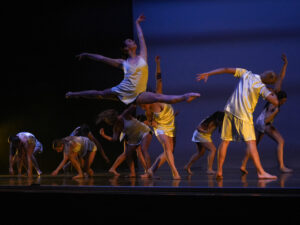Slain journalist honored with Tully Award for Free Speech
Slain journalist honored with Tully Award for Free Speech
Maltese investigative journalist Daphne Caruana Galizia was assassinated by a car bomb as she left for work on October 16, 2017.
In the Joyce Hergenhan Auditorium on Tuesday night, her husband, Peter, and sons, Matthew and Paul, accepted the Tully Award for Free Speech in front of the Syracuse University community. The award commemorates a journalist who displays courage in the face of a free speech threat. Previous winners have hailed from outlets such as the Washington Post and The Guardian.
Galizia, however, did not have the experience of working for a famous news outlet. When she started writing, Malta only had two print newspapers. Additionally, the country still does not have a recognized school of journalism. Galizia received most of her training in anthropology and archaeology, which she translated into her field of data journalism.
None of those disadvantages stopped Caruana Galizia. She wrote for The Sunday Times of Malta and The Malta Independent. In addition, she maintained an online blog, named Running Commentary
When Roy Gutterman, director of the Tully Center for Free Speech and associate professor at Newhouse, asked her family to describe her, the answer was short.
“She was a force of nature,” said Peter Caruana Galizia, a lawyer in Malta’s capital, Valetta. “When she wrote her first column for her newspaper, the guy she interviewed was very taken aback because she was very direct, which wasn’t done back then. And when the column came out he was not very happy. But she didn’t hide.”
There was a lot to hide from. Throughout her career, Caruana Galizia faced threats against herself and her family. She was harassed in the streets and her image was attacked by members of the Maltese government, who used parliamentary privilege to slander her.
According to Peter, his wife faced over 60 libel suits during her career, including one notable case where she received a suit for every offending sentence she wrote in one piece. The threats affected her three sons as they grew up, as all three believed such harassment was normal.
“We came home one day and one of our dogs was dead on the porch with its throat slit,” said Matthew Caruana Galizia, a data journalist with the International Consortium of Investigative Journalists. “The side of our house was burned as well. One time, a mayor from the governing party saw her and my father walking in the street and raised a mob to chase them. They had to hide in a building to be safe.”
None of that held Caruana Galizia back, though. She continued to write about and investigate multiple instances of corruption in government. This culminated in her work based on the Panama Papers, which was picked up by outlets around the world.
The brothers rejected the claim that cameras or security measures would have helped save their mother. The family would not have wanted nor could have afforded the type of security measures that could have physically protected her.
“The sad thing is the best protection she could have gotten is if her work was followed up on,” said Paul Caruana Galizia, who is currently an economist in London. “Instead, the police force and government members she investigated walked free for a long time. It frustrated her.”

“To do what needed to be done, you need a special combination of courage and tenacity that only a few people have. My wife was one of them.”
– Peter Caruana Galizia
Frustration was a common theme in Caruana Galizia’s reporting career. Before she broke into the scene, it was common practice for reporters to hide their names. Caruana Galizia had to become a pioneer in a country that didn’t want her innovations, and that burden took its toll.
“She was often frustrated that she was the only one asking these questions and finding answers,” Matthew remembered. “It was at a point where she was almost the only opposition voice to the corruption that was happening in the government and she was worried. She tried helping and training journalists, working with them on their stories, but she was still the only one making a real impact.”
“To do what needed to be done, you need a special combination of courage and tenacity that only a few people have. My wife was one of them,” Peter said. “Her death set democracy in Malta back by many decades.”
Nevertheless, there was some improvement amongst Malta’s journalists. Following Caruana Galizia’s reporting, many reporters started using their own names in print, and women entered the previously male-dominated industry. Malta also began establishing more media outlets, with four newspapers in English and in Maltese being set up since the 1980s. Most significantly, an online investigative platform, The Shift News, was founded in 2017 following Caruana Galizia’s death.
The assassination itself, however, sent a message of fear to Maltese citizens, who saw Caruana Galizia as their voice against injustice. The suddenness of the event even shocked her own family, who thought that after surviving more than 30 years of persecution, they might be safe.
“We thought, you know, in 2017, that we might be past all this,” Paul said.
Matthew was in the family house during the bombing and still vividly remembers the events of that day.
“She walked out the door to the car, and the next thing I remembered there was the sound of a huge explosion in the street,” Matthew said. “I knew immediately that it was a car bomb and I ran outside and down the road. At first, I was confused because there was fire everywhere. The grass and the road itself were on fire. Then I saw a huge fireball, and I realized that was the car.”
Reactions to Caruana Galizia’s death from around the world were of shock and condemnation. President Antonio Tajani of the European Parliament called the assassination “a tragic example of a journalist who sacrificed her life to seek out the truth,” while other international bodies such as the European Commission also vocally condemned the perpetrators.
In Malta, vigils were held in Caruana Galizia’s hometown of Sliema and in Valletta, and trees were planted in her name, as well as the San Anton School where the Caruana Galizia siblings, including Andrew, studied. Caruana Galizia’s daily and weekly columns were published as blanks to honor her.
Reactions from the Maltese government, however, were not as universally well-received. Prime Minister Joseph Muscat and opposition party leader Adrian Delia, both figures who were investigated by Caruana Galizia, released their own vocal condemnations. An investigation into the incident by the Maltese Police Force, aided by the FBI, the Dutch police, and Europol, resulted in three men being charged for the assassination.
The family, however, believes the results of the investigation are a sham to cover for the actions of a different actor.
“Our mother never investigated or wrote about the men who were arrested,” Matthew said. “And it takes more than three men to plan a car bombing, especially of a high-profile figure. With these arrests, the Maltese government is trying to close the case and move on, so that she can be forgotten.”
The government has also taken an active role in keeping the Caruana Galizia family in the dark about Daphne’s murder. Caruana Galizia was an outspoken critic of the Maltese Police Force during her career and distrust of the police means little evidence will reach the authorities.
“Our mother was arrested multiple times by the police, she had little reason to trust them,” Paul said.
International journalists can do their part in aiding the investigation, according to Matthew.
“Look into the networks between countries that allow actors like this to move money and materials,” Matthew said. “Finding the networks will help find the people behind our mother’s murder.”
After speaking to Gutterman, the family took questions from the audience. One student asked what kept the family motivated to keep working, and what made a good journalist.
“Outrage keeps me motivated,” Matthew said. “You must never become cynical, you need that outrage to keep fighting for what is right.”





